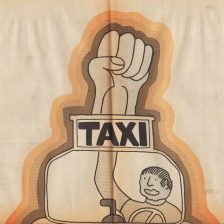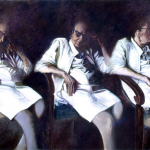This article was published as one of two stories about Bruce Springsteen’s Super Bowl Ad. The other was written by Mike Morgan.
There’s a chapel in Kansas
Standing on the exact center of the lower forty-eight.
It never closes.
All are more than welcome
To come meet here, in the middle.
It’s no secret the middle has been a hard place to get to lately
Between red and blue
Between servant and citizen
Between our freedom and our fear.
Now, fear has never been the best of who we are.
And as for freedom, it’s not the property of just the fortunate few.
It belongs to us all.
Whoever you are, wherever you’re from
It’s what connects us.
And we need that connection.
We need the middle.
We just have to remember the very soil we stand on is common ground.
So, we can get there.
We can make it to the mountaintop
Through the desert
And we will cross this divide.
Our light has always found its way through the darkness
And there’s hope on the road up ahead.
Bruce Springsteen may have brought down the TV house with his Super Bowl half-time spoken word performance. As always, the performance reflected talent and style. But it was way off key.
The word song begins with the observation that there’s a chapel in Kansas that’s in the middle of the country. Maybe there is but I’m not sure that a chapel defines what’s essential about America. No choice of a definition is necessarily better than another but each choice sends us looking in different directions to understand what’s right or what’s really wrong. Springsteen chose an image that eliminates quarrels. But, in this day and time, quarrels need to be at the center of America.
Springsteen says that the middle is a hard place to get to. Why? It seems to me like it’s a really easy place to get to—all you need to do is to watch CBS/NBC/ABC/CNN/MSNBC and you find the map to the middle. I don’t think that Springsteen was thinking when he wrote those words (if he did write them). He got stuck with the “middle” and kept trying to make it work. And did he work hard—so much so that he may have produced the single worst line in his song-writing career-“Between servant and citizen”. What in the world does that mean? I’m afraid that it’s just a line to fill out the song.
Freedom and fear—I’ll grant you that fear is frightening, but without fear nothing important is really possible. Think, for example, of the Civil Rights protesters who had to face down water hoses, dogs and crazed cops; think of soldiers in revolt against the war in Viet Nam who faced court martials; think, more recently, of the anti-police protesters of 2020 who faced battalions of police armed like soldiers ready to crush their heads and their spirits. They knew real fear. But that fear doesn’t make an appearance in Springsteen’s lyrics. No, we know whose fear he’s trying to appease. And it’s not the fear of those fighting for freedom.
Springsteen claims that freedom belongs to all; it’s not so—freedom should belong to all. It doesn’t and my best guess is that, in more than forty-five years of music making, Springsteen has never made that error before. Whose lines was he writing or whose lines was he reciting?
And then he performs what can only be considered the equivalent of political/musical alchemy—turning one thing into something entirely different. Freedom turns into the middle. The middle of this country until 1863 thought that slavery was just fine. And the middle in Germany from 1933 to 1945 thought that national socialism was also just fine. The “middle” is the place where absent-mindedness, amnesia and cowardice rule the day.
Instead of gushing over what connects us, we need to know what divides us and figure out how to fight it out. Hannah Arendt wrote a lot about the Dreyfus Affair in France and she commented that the political struggle over it broke apart every family in France. Much the same happened in the US during the Civil Rights protests and the anti-Viet Nam war protests. At a time when we need to fight it out, Springsteen is prescribing political morphine.
And then to add insult to injury, Springsteen claims that the “soil is common ground.” Tell that to the Native Americans who have been holding on for dear life to the lands that were left to them. Tell that to the kid from the South Bronx who’s never been on the other side of the Hudson River. Tell that to the families of West Virginia who’ve watched their mountaintops sliced off in the quick and easy extraction of coal. I know, I know, he wasn’t really talking about real soil. But maybe he should have been.
I guess I’ll stop. One last thought—even though he pretends a bit at the end, Bruce Springsteen has turned out to be no Martin Luther King. The mountaintop he’s celebrating is more like a small hill.



Leave a Reply